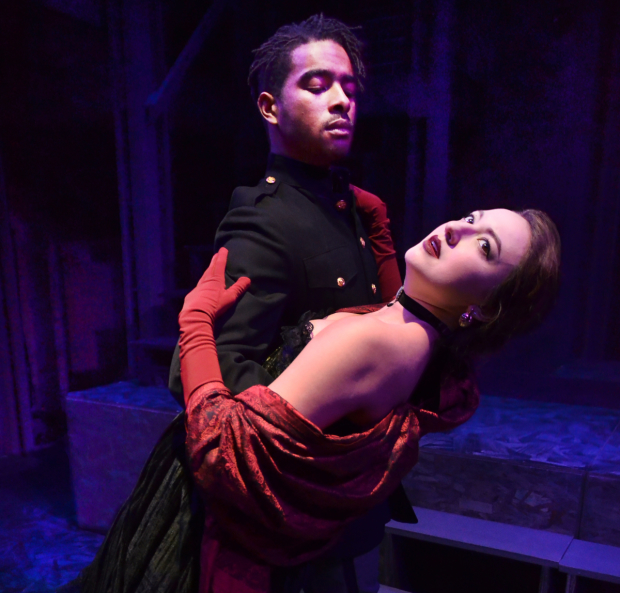A Tragic Love Story Takes Center Stage in Anna Karenina

(© Suzanne Plunkett)
It seems like people can’t get enough of Anna Karenina. In the 140 years since the publication of Leo Tolstoy's novel, multiple adaptations have taken to the stage, including operas, ballets, and a disastrous 1992 musical. Anna Karenina has generally been mounted as a big-budget affair, as befits the grandeur of Russian high society. However, at Chicago’s Lifeline Theatre, Jessica Wright Buha’s new, streamlined adaptation captures the heart of the novel without the benefit of a large, opulent production. Furthered by compelling direction from Amanda Link and a young, vital cast, this Anna Karenina is as tragic as it is romantic.
Tolstoy’s novel is not only one of the great tragic love stories, but also a philosophical treatise on morality, social change, religion, and politics. Lifeline Theatre’s production focuses on the two main narratives of the novel: the love affair carried on between the married Anna Karenina (Ilse Zacharias) and army officer Vronsky (Eric Gerard) to her ruin; and the budding romance of Anna’s sister-in-law Kitty (Brandi Lee) and her childhood friend, reformist landowner Levin (Dan Granata). Their stories incorporate countless cousins, in-laws, and sundry aristocrats, moving between Moscow, St. Petersburg, various country estates, and all the trains and train stations in between.
In the title role, Zacharias shows the equal parts of fragility and passion that lead Anna to her tragic end. She looks at Vronsky, played by Gerard with the candor and shameless sexuality that the role requires, the same way a woman dying of thirst looks at a glass of water. When their lust turns to love, their feelings are visceral enough that it is a shame to see them wane in Act 2. Michael Reyes gives Karenin, Anna's husband, something more than an icy, paternalistic disdain, allowing the audience to sympathize with the slighted man even while Anna despises him.
Highlights from the well-rounded supporting cast include Lee, who charms as the young idealist Kitty; and Michele Stine, whose vocal work and puppetry as the Karenin’s young son, Seryozha, is surprisingly moving. It’s a testament to the cast’s utter commitment, as well as Link’s direction and Stephanie Diaz’s puppet design, that many of Anna Karenina‘s most emotional scenes are shared with a little child puppet.
Though the religious elements of the novel are largely excised in this adaptation, Christian iconography is prevalent in a painted motif in Joanna Iwanicka’s scenic design. The cast looks sharp in Izumi Inaba’s costumes, that include furs, hats and fine coats that help set the play’s mood. Diane D. Fairchild’s dappled, painterly lighting adds to the play’s melancholy. Trains recur as a visual element, both in Iwanicka’s cleverly compartmentalized, modal set that serves as a broad variety of locales, as well as in the movement design by Kasey Foster.
Even with a runtime of approximately two-and-a-half hours, Lifeline’s stage adaptation makes significant cuts to Tolstoy’s heavyweight novel. Buha distills Anna Karenina down to its essential moments, sacrificing much of Tolstoy’s philosophizing and ornate prose, but retaining the novel’s emotional depth. It’s an impressive piece of theater that feels as opulent and fully realized as a production twice its size.










